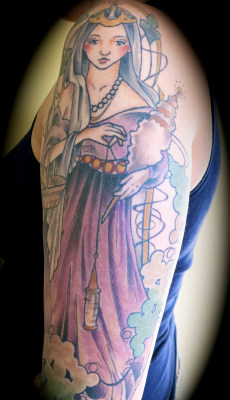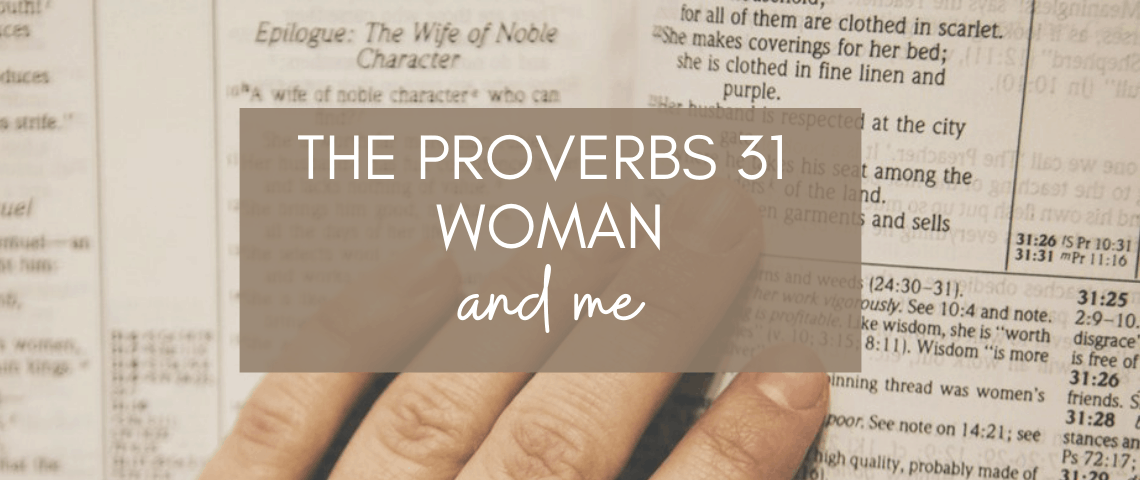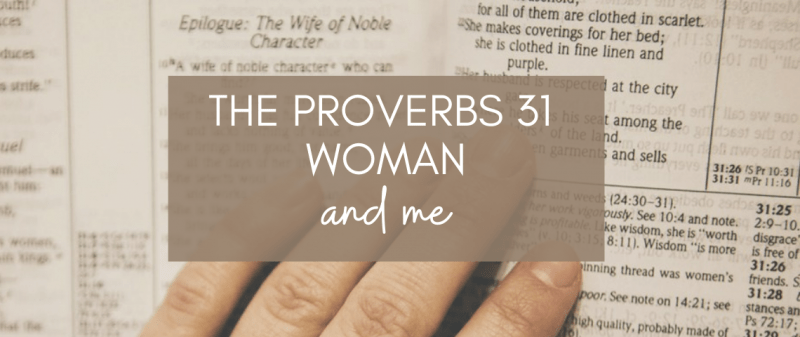I have a confession to make. I don’t have a problem with the Proverbs 31 Woman.
One of the upsides to growing up Catholic is that I lack much of the scriptural baggage that my evangelical friends cart around, particularly in regards to Proverbs 31. I was exposed to the text through the rhythm of the liturgy, but it was never emphasized during the early years of my religious education.
So when I stumbled across this proverb I was impressed. Here was a woman in scripture who embodied the virtues described throughout the Book of Proverbs, who seemed to know herself and what she was about, and was praised for this.
I was unaware that this passage was being handed out during my high school and college years as a job description to my non-Catholic female peers and as a shopping list for my male counterparts. I eventually figured out that the woman of Proverbs 31 was the source of spiritual frustration through conversations punctuated by heavy sighs and numerous eye rolls. I realized that many evangelical women have a conflicted relationship with this person – an impossible standard to live up to, and yet everything they were supposed to be.
Maybe I was reading it wrong. Maybe I was supposed to have a problem with her too. I tucked my affection for this passage away and stopped bringing up Proverbs 31 in conversation.
Eshet Chayil
A couple of years after college I stumbled across Rachel Held Evans’ series on Women of Valor, and her analysis of this passage and the phrase “eshet chayil” (woman of valor). Her writing revealed that this passage was never intended to be a check-list for women, but was instead a poem of praise and a summary of the virtues described throughout the book of Proverbs.
Her words felt redemptive and permissive. I was allowed to like this proverb again, to stop feigning frustration and contempt. Someone had finally put into words the original emotional response that I felt when I first discovered the description of this woman – that this was an accolade, not some formula for being the perfect Christian woman. I could openly embrace scripture that I previously felt obligated to wrestle with.
Rachel’s words were so freeing, and this passage had such an impact on me that I did what any sensible person would do – I went out and got an eshet chayil tattoo. Not the words eshet chayil, but an actual portrait of the Proverbs 31 woman.
 This passage and the tattoo are significant – a tribute to the women of valor in my life, and affirmation and praise of their character and accomplishments. It is a reminder to myself to always aspire to be a woman of valor.
This passage and the tattoo are significant – a tribute to the women of valor in my life, and affirmation and praise of their character and accomplishments. It is a reminder to myself to always aspire to be a woman of valor.
This all sounds very dramatic, to be so touched by scripture that I had to have it represented in ink on my arm. But something about the significance of the tattoo changed when I found out that I was pregnant a few weeks after the initial line-work was done. And then, a few months after that, we found out that baby was going to be a girl. Somehow, all of the intention behind the tattoo, the excitement at being allowed to really love a text suddenly felt so naïve.
It’s one thing to be excited about aspiring to be a woman of valor. It’s a completely different matter to actually be one and to attempt to raise one up.
New Questions
And now my daughter is here, and my tattoo is complete, and I am still mulling over what it really means to be a woman of valor, and for my husband and me to raise up this child to be a woman who is one.
It’s a daunting task and one that is puzzling at times. How do I ensure that my child will have a heart that is compassionate toward the poor and vulnerable? How can I ensure that this tiny person will someday work diligently to meet the needs of her family? Even if we model good financial stewardship, how can we guarantee that she will be prudent in that regard? There are so many questions that need answers.
Even as I move away from reading this passage as a prescription for women to reside in the strict role as homemaker, it can easily become another list – where the essence of being “eshet chayil” is reduced to just being a “good person.” And that’s not enough.
Perhaps the trouble is that this proverb, and more specifically verses 10-31, are read and studied in isolation. The reality is that this passage is an acrostic poem tacked to the end of an entire book that instructs in the ways of wisdom.
A Woman Who Fears the Lord
When I sit with this piece of scripture and dwell on it, I find myself clinging to the second to last verse, “a woman who fears the Lord is to be praised.” The Book of Proverbs begins with the assertion that “the fear of the Lord is the beginning of knowledge,” and here it ends with a similar declaration following the description of the eshet chayil.
And the conclusion that I have come to is this: that the essence of echet chayil, the core element of being a woman of valor, comes down to fearing and loving the Lord.
Everything else, every other piece of character or wisdom or strength flows forth from the way in which this woman relates to God. The best thing that I can do to be a woman of valor for my daughter is to fear the Lord – to reverently and passionately love and follow Jesus.
The best thing that I can hope and pray for my daughter is that she will do the same.





12 responses to “The Proverbs 31 Woman and Me”
I was brought up equal, and it is still a shock to find people discussing social equality as related to gender. Surely the bible discusses how the church as wife should behave rather than what half of the species should do.?
GREAT POINT, Hazel! I love your way of thinking – makes to much sense.
Hannah, thank you so much for emphasizing the nature of the text as a description of the wisdom found throughout the book of Proverbs. As I’ve written about too, the Proverbs 31 Woman is not a person; she’s a personification. The whole book of Proverbs is written as a chiasm, with wisdom personified as a woman in the opening chapters and again in the last chapter. This wisdom is given for men and women both, and it’s not a standard to aspire to but a blessing to rest in.
Cheers,
Tim
P.S. I’ve been to Mt. Shasta High School when my high school band played there on a northern California tour back in the 70s. I think you weren’t born yet.
Tim -Yes! I couldn’t agree more. It is also exciting to hear from folks who actually know where Mt. Shasta is on the map. I may not have been around yet when you visited my hometown, but there’s a fair chance you crossed paths with one of my many relatives!
Hannah,
I have not met you to my knowledge, however, you are cherished, prayed for, and loved. Thank you for this wonderful entry. Touched my heart because of it’s simplistic truth. Fear the Lord. Crazy how it’s spelled out for us, and yet, it’s one thing that we ridiculously struggle with. My regards to you, Ben, and your daughter! Thanks again!
Bree Barnett
Thank you for your kind words. And yes – the truth of that passage is so clear and simple, but so challenging at times!
I love Proverbs 31. I just wish that my church focused on it as much as on the verses that talk about being a mother. If we only teach our daughters how to cook and sew and clean, and we teach our sons to be breadwinners who make all the financial decisions, how will husband ever trust their wives with major financial transactions without their micromanagement, and who will wives ever learn to buy and sell real estate or manufacture or manage employees? Don’t tell me she isn’t capable of Proverbs 31 if you’ve never prepared her for it.
Lianne – it’s been so encouraging to hear that others love Proverbs 31, though frustrating to hear accounts of women who are still told that the essence of their womanhood is tied to a narrowly defined role. And I think that you make an excellent point that women who are given a limited framework will be limited in numerous ways.
Great post and tattoo! I’ve always loved the P31 woman as well. The frustration lies in looking at it backwards as a “to do” list instead of the natural outflow of an abundant life. Her compassionate deeds come from a heart yielded fully to God’s plans and purposes. I like how she pursues beautiy and excellence in all she does as I believe that reflects the character of God too. Thanks for your insight.
Thank you! I share that same frustration, and to be honest, I think it is so much easier at times to follow a prescribed list or to check off boxes than to cultivate a deep relationship with God… but you’re absolutely right – compassionate action and excellence are a natural outpouring of a heart that is right with God.
Fantastic post, Hannah, and I love the tattoo!
I have not had a problem with Proverbs 31 girl either until I’d heard a lot of negative press… and it was only after really thinking it through that I understood ‘no, this is permission for a woman to be whatever she’s geared for – leader, creative, businesswoman, carer, craftswoman, fun, interesting, etc.’
Maybe I’ll get an Eshet Chayil tattoo too… xx
Thank you Bev! I agree – I very much see this description as blank canvas in a sense. Here is a picture of a woman who is excelling in many areas, and the reason for that has to do with how she relates to God. I think that once my focus shifted to this – to cultivating wisdom based on a fear of the Lord – I was able to see that the options and venues in which to be an eschet chayil are limitless.